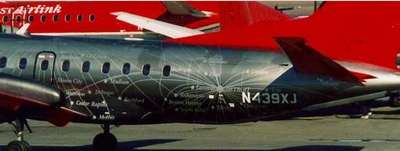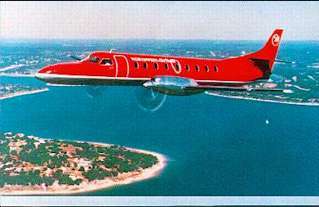ALPA Claims Management Tactics Giving Rise to Lawsuit
 Northwest Airlink pilots who fly for Mesaba Airlines and are
represented by the ALPA, will demonstrate against what pilots say
is management's bad faith bargaining tactics at three major US
airports on Monday morning, June 9. Uniformed pilots will protest
recent management actions they claim have provoked them into suing
Mesaba Airlines earlier in the week for violating the federal law
governing labor negotiations in the airline industry. The pilot
picketing also coincides with two other milestones: negotiations
entering their third year and the anniversary of the amendable date
of the current contract.
Northwest Airlink pilots who fly for Mesaba Airlines and are
represented by the ALPA, will demonstrate against what pilots say
is management's bad faith bargaining tactics at three major US
airports on Monday morning, June 9. Uniformed pilots will protest
recent management actions they claim have provoked them into suing
Mesaba Airlines earlier in the week for violating the federal law
governing labor negotiations in the airline industry. The pilot
picketing also coincides with two other milestones: negotiations
entering their third year and the anniversary of the amendable date
of the current contract.
Three Cities Targeted For Picketers
 Pilots will picket in front of the departure and
ticketing level doors at Minneapolis/St. Paul, Detroit, and Memphis
airport terminals between 9:00 a.m. and 12:00 p.m. CDT. Pilots in
full uniform will carry signs and march in military fashion in a
show of solidarity and support for union leadership and
negotiators.
Pilots will picket in front of the departure and
ticketing level doors at Minneapolis/St. Paul, Detroit, and Memphis
airport terminals between 9:00 a.m. and 12:00 p.m. CDT. Pilots in
full uniform will carry signs and march in military fashion in a
show of solidarity and support for union leadership and
negotiators.
"Mesaba management has recently reneged on previously agreed-to
elements of the contract and it is now seeking to revise its own
prior positions to be far less favorable to the pilots without any
costing justification," said Captain Tom Wychor, chairman of the
ALPA unit at Mesaba Airlines. "Pilots obviously view these actions
as yet another in a series of many stalling schemes that management
has employed throughout the course of our protracted contract
talks, clearly demonstrating to pilots that they have no serious
intention of reaching a new agreement."
Mesaba Trying To Shortcut The Rules?
Contributing to the frustration of the pilot group - and another
basis for the pilot suit - is their belief that Mesaba management
has been attempting to circumvent ALPA as the exclusive bargaining
agent for the pilots.
"Mesaba pilots are represented at the bargaining table by an
extremely competent negotiating committee that takes its direction
from a unified membership intent on attaining a fair contract,"
Wychor said. "Management should not go around the union and
question individual pilots about contract negotiations."

The current pilot contract, ratified in 1996, was extended to 6
years as part of a concession package that granted Mesaba the
opportunity to obtain new regional jets from Northwest Airlines.
The growth bolstered profits to over $31 million in 2000, and
granted a cumulative savings to the company of $12 million. Despite
current industry woes, Mesaba continues to turn profits and closed
fiscal year 2003 on March 31 with a profit of $4.3 million
"Our pilots sacrificed pay and career progression for the
opportunity to be rewarded when our new contract was due last
year," Wychor said. "Instead, management has broken their promises
of rewards, bargained in bad faith and used threats against job
security to prevent the conclusion of a fair and equitable
agreement."
Pilots Question Investment
Last winter, Mesaba's parent company purchased Big Sky Airlines,
a small regional airline based in Montana that also code-shares
flights with Northwest. Although management claims that Big Sky was
purchased as a "growth vehicle" for the company, Big Sky has lost
more than $2 million since December. Despite attempts to expand
service in the Pacific and Intermountain West, Big Sky had faced
bankruptcy even before the purchase offer was made.

Mesaba's pilots have serious concerns about the financial losses
at Big Sky. "Mesaba's long time and loyal employees created the
profits that have made our Company strong," said Wychor. "Now the
savings from pilot concessions are being used to subsidize a
money-losing operation, while our pilots are being told to accept
cuts."
Despite the lackluster status of negotiations, which have been
federally mediated since last August, pilots are committed to the
process and have proven through unparalleled performance, safety,
and professionalism that they are faithful to Mesaba.
"Our pilots have contributed to some of the best on-time airline
stats in the industry. Our safety record is untarnished. We intend
to continue that service to Mesaba and Northwest until an impasse
occurs," said Captain Michael Dockman, the pilot in charge of
preparing pilots for a possible strike. "Nobody wants a strike -
everybody wants a contract, including all Mesaba employees. It is
high time our management recognizes this."
 Aero-News: Quote of the Day (12.09.25)
Aero-News: Quote of the Day (12.09.25) ANN's Daily Aero-Term (12.09.25): High Speed Taxiway
ANN's Daily Aero-Term (12.09.25): High Speed Taxiway ANN's Daily Aero-Linx (12.09.25)
ANN's Daily Aero-Linx (12.09.25) NTSB Final Report: Diamond Aircraft Ind Inc DA20C1 (A1); Robinson Helicopter R44
NTSB Final Report: Diamond Aircraft Ind Inc DA20C1 (A1); Robinson Helicopter R44 ANN FAQ: Q&A 101
ANN FAQ: Q&A 101





